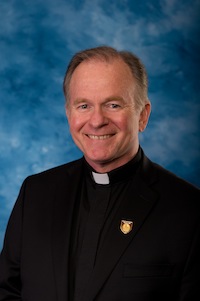Much Ado about Congressional Chaplains

The recent situation between Speaker Paul Ryan (R-WI) and House Chaplain Father Patrick Conroy was very confusing. Initially Ryan had a staff member request that Conroy resign—which the Father dutifully did—but no written or verbal explanation was provided as to why he was being asked to step down. After representatives from both sides of the aisle complained and Conroy consulted with an attorney, the chaplain decided to rescind his resignation, which Ryan accepted and has since been in discussion with Conroy “about how to improve the services going forward.” Although we’re back where we started, the controversy continues and several questions remain.
What are the requirements of congressional chaplains?
Congressional chaplains are hired based on a majority vote of the legislators they serve—one for the House of Representatives and one for the Senate. According to the House Chaplain website:
In addition to opening proceedings with prayer, the Chaplain provides pastoral counseling to the House community, coordinates the scheduling of guest chaplains, and arranges memorial services for the House and its staff. In the past, Chaplains have performed marriage and funeral ceremonies for House members.
There is no further detail on regulations for congressional chaplains. There are no rules about the content of their prayers (though some would say they shouldn’t get too political), there are no requirements on their religion (though all Senate and House chaplains have followed some form of Christianity), and there are no restrictions on who they may give interviews to (though some were not fans of Conroy’s interview with the National Journal). Before Conroy, no congressional chaplain had ever been fired or asked to resign. It should take a majority vote to fire chaplains or accept resignations, so it doesn’t appear Ryan had the authority to ask Conroy to resign. Two attempts to form a select committee to look into why Conroy was asked to resign have failed.
When planning to replace Conroy, debate grew on what experience was needed for a chaplain to serve members of Congress. Rep. Mark Walker (R-NC) wanted the new chaplain to have adult children to better connect with the legislators, but that would exclude celibate chaplains and was regarded as discriminatory against some religions. Walker made a good point about wanting someone with “some counseling experience or [who] has managed or worked with people, maybe a larger church size.” Congressional chaplains serve not only legislators but also their staffs and families, creating a constituency of thousands. They should know how to manage that workload. More importantly, they should have interfaith experience as their constituents come from different religious backgrounds and have different spiritual needs. They should also support religiously unaffiliated constituents who are joining the new Freethought Caucus.

House Chaplain Father Patrick Conroy
Ryan said members complained that their pastoral needs weren’t being met but he never raised this concern with Father Conroy. In a letter to Ryan on May 3, Conroy wrote:
I have never been disciplined, nor reprimanded, nor have I ever heard a complaint about my ministry during my time as House Chaplain…Had I known of any failure in providing my ministry to the House, I would have attempted to make the appropriate adjustments, but in no case would I have agreed to submit a letter of resignation without being given that opportunity. Therefore, I wish to serve the remainder of my term as House Chaplain, unless terminated “for cause.”
Apparently now the speaker and chaplain are discussing how best to serve the House community—a discussion they should have had each time Conroy was sworn in to a new two-year term.
How is pastoral counseling measured?
Representatives shared different views on the satisfaction of their pastoral care, but it’s unclear how many went directly to Ryan to cause him to take action. Every job needs clear measureable goals and expectations to evaluate employees. And these measurements must be articulated to employees so they can improve. Are congressional chaplains evaluated by the number of hours spent with people, number of people served, number of times they reach out to someone, number of hours they’re available to people, how good people feel after talking with them, number of ceremonies they officiate, and/or type of support given?
If inadequate pastoral service is a problem, then perhaps it’s because a white Christian man is unable to handle all the pastoral issues that arise. However, that has been the description of every congressional chaplain since 1789—except current Senate Chaplain Rev. Barry Black, an African-American Seventh-Day Adventist. Muslim, Hindu, and female chaplains have only delivered prayers as one-time guest clergy.
Why does congress need to hire full-time chaplains?
Each congressional chaplain has a salary of over $150,000—$172,000 for the House chaplain—as well as staff and an operating budget of $400,000. Why must taxpayer money be used for the spiritual care of Congress members? “Unlike members of the military or people who are incarcerated (who commonly have on-site chaplains), members of Congress have plenty of religious options,” pointed out Rachel K. Laser, president and chief executive of Americans United for Separation of Church and State. Congress could easily produce a directory of available houses of worship near the Capitol and provide meeting space with office hours for visiting chaplains.
Along with connecting legislators with outside religious services, Congress should have guest speakers provide the morning prayers to bring in diversity. Then all Americans can be exposed to a variety of inspiring religious leaders, as well as humanist chaplains. As I wrote in a piece about the Oklahoma chaplain controversy, opening words for government meetings should include “anything that helps attendees wake up and focus on the rest of the proceedings.”
There are so many other issues that Congress needs to focus on. Arguing over a position that no longer needs to exist—and would be better done by a network of interfaith professionals—is a waste of taxpayer money and government time.
